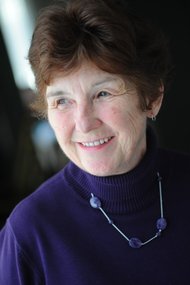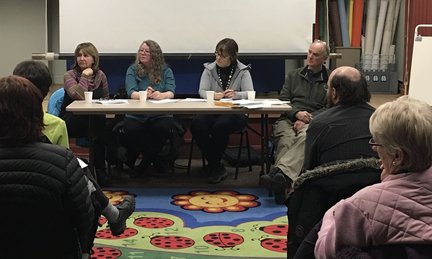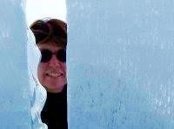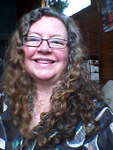|
“I’ve developed a thicker skin,” John Pringle told the gathering of 18 people who attended the NOWW Critique Workshop on March 14 at the Waverley Library. One of four members of the Thunder Bay Writers Guild who demonstrated their feedback techniques by critiquing two pieces of writing in front of the audience, Pringle said he’s benefitted from being part of the group “more than I ever thought I would.” Pringle, who recently published his second collection of short stories, Spirals: Stories of Northwestern Ontario, and has won literary prizes from NOWW and the Canadian Authors Association, travels from Atikokan to attend the monthly Guild meetings. “You have people who are going to read your work and be honest with you,” he said. Guild president Deborah de Bakker talked about the commitment required to belong to a critique group. Each member of the group must contribute a story every four months. The other members are expected to read the stories ahead of the meetings and come prepared with both an oral and written response. Those critiques are “blunt”, she said, but must always be respectful and never include personal attacks.
“My writing is so much better because of the Guild,” said Sue Blott, a multiple award winner in NOWW Literary Contests. She likes the structure of having to write to a deadline. “That discipline is wonderful for me.” A teacher by day, Sherri Lankinen, writes poetry, fiction and nonfiction. She has driven through snowstorms from her home in South Gillies to take part in the monthly evening critique sessions. “The biggest thing for me is motivation,” she said. The Guild now has its full quota of 12 members. When a space opens up anyone who would like to join must submit samples of their writing, which are read by a selection committee. Other Writing Groups in Thunder Bay Another critique group in Thunder Bay is seeking members. Writers Northwest currently functions via email rather than meeting face to face. This group also has an application process for joining. For more information contact [email protected]. Blue Sky describes itself as “a very humble writing group” that meets bi-weekly on Tuesdays at 4 pm at Blue Sky Community Healing Centre, 512 Victoria Avenue East. It is a group for experienced writers as well as newcomers. For more information, call Cindy Crowe at 807-473-9851. The Writers Circle meets at the Waverley library the last Wednesday of the month. It’s described on the website as having a “fluid” membership, welcoming new faces at every meeting. Here’s a link for more info: http://www.tbpl.ca/writers Below are the guidelines John Pringle put together for how the Thunder Bay Guild operates. On Giving Criticism
0 Comments
 How long have you been a member of NOWW? Many years. Can’t remember when I first joined. What do you normally write? I write literary short fiction, creative non-fiction, memoir, essays. Do you have a favourite book or favourite author? My favourite books change all the time. I read about a hundred a year. One or two always speak so strongly to me that I remember them and think about them long afterward. Here are a few: Any Human Heart by William Boyd, The Russlander by Sandra Birdsell, Sweetland by Michael Crummey, The Tin Flute by Gabrielle Roy. Some books are so powerful they explode in your hand. I felt this when reading In the Darkroom by Susan Faludi, or The Two Spirit Journey by Ma-Nee Chacaby, two of my favourite books of 2016. But books are personal things. What one person loves, another person shrugs off. At the end of every year, I put a list of my favourites on my blog, Literary Thunder Bay. I try to limit the list to the top ten although sometimes it grows to the top fourteen or more. I sometimes add a separate list for non-fiction or for graphic novels which I love. I love short stories and that leads first to Alice Munro. But there are others: William Trevor, Pushkin, Anton Chekhov, Katherine Mansfield, Margaret Atwood, Mavis Gallant. And we have some terrific short fiction writers in Thunder Bay such as John Pringle, Marion Agnew, Sue Blott and many others. I listen to short stories that I find on the net. I buy audio CDs of short stories when I can get them. I believe you can learn a lot about writing from hearing a piece spoken. Let’s get to know you a bit better. Tell us a bit about yourself and how you found your way to writing: I started writing fiction quite late in life. My writing began with a column in the Northern Woman’s Journal about women’s issues and a weekly column in the Thunder Bay Source about immigrants. Then Herizons magazine in Winnipeg phoned and asked me to do an interview with Laurie Conger, a local musician. This assignment led to other interviews for Herizons. I loved talking to people, trying to figure out their motivation, get at their basic story. My first attempt at short fiction described an ideological split in a women’s group. It was never published but I learned a good lesson. All the women I showed it to thought it was about them! So I joined a writers’ group and let my writing colleagues do the critiques, one of the best ways to learn the craft. I now belong to three groups. They motivate me. Analyzing the work of others and listening to the comments helps me a lot. Some people are so insightful they can put their finger right on the problem. The more you experience this and the more you write yourself, and the more you are open to criticism, and the more you read, the more you learn; and of this learning, there is no end. I am still learning stuff: about character, about interior voice, about structure, about slipping in the basic facts at the start. And I am sure there is more that I haven’t thought about yet, but one day I know I’ll go to a workshop which will shoot an entirely new concept into my brain. One of the best things about writing is belonging to writing groups and book clubs and attending readings and launches. I go to at least one writers’ conference a year and I always learn something of value. I’ve also spent time at writers’ colonies in Newfoundland, Arkansas, and Devon England. I like to travel so it is a bonus to add a writing event into a trip. It is a double bonus to hear writers like Joan Clark, Miriam Toews, Diana Gabaldon or Jack Whyte. One thing I have learned to take with a pile of salt is the traditional list of tips for writers. Most of these so-called rules have been broken over and over by the best in the field. Show, don’t tell! I can hear Alice Munro laughing. She “shows” all the time as did the great master, Anton Chekhov. Write every day, another clichéd tip. Says who? Everyone has to find the method that works. A novel must have a certain structure. Rachel Cusk, in her recent wonderful novel, Transit, drop kicked that rule into the dumpster. I have learned to evaluate criticisms. It’s a good exercise which forces you to think deeply what you are trying to do. Even a confusing or off-topic criticism may have a germ of good sense hiding in it. And it is good practice to listen even though you may not follow the advice. I write a lot of stuff that has no hope of being published but who knows, an anecdote or a slight bit of story may be worked into something one day. I keep a journal, also a clichéd tip, but one that works for me. Tell us a bit about your writing and what the process of writing is like to you: Recently I have been working with memoir but it’s difficult because you have to be absolutely honest about yourself. You have to study yourself with all the courage you can muster. You also have to consider the historical circumstances of your life, not only your family background but the zeitgeist where chance has placed you. Writing memoir feels like you are pulling your heart out of your body and cutting it up. But I believe that unless a memoir cuts to the heart, it is not worth doing at all. Brutally honest memoirs like Joe Fiorito’s The Closer We Are to Dying or Maria Campbell’s Half Breed stay with you forever while memoirs that pull their punches float away into the land of forgotten books. Once I get an idea for a story, I can’t stop until I get it written down. Sometimes I stay up all night. But I am never sure if it is going to work of not. I put the story away for a month or two and sometimes I am happy with the way it reads later and sometimes not. My main problem as a writer is getting that original idea and then I’m off and running. Basically, I’m a binge writer. What are your favourite stories? What inspires you? My favourite story, by far, is, “The Dead” by James Joyce. It is a layered story revealing several ideas and shades of meaning that aren’t necessarily apparent on first reading. This is my ideal story. It is like turning a beautiful vase around in your hands and seeing different lights and combinations of colours as it moves. Alice Munro does it perfectly. I only marvel. Like many writers, I sometimes use an event from my past and try to work it up as a story. I have written about my childhood habit of breaking into houses and the time I set fire to the staff room during my first year teaching What inspires me? Real life stories. I love listening to people. A Ukrainian immigrant, a doctor, described her experiences during the Chernobyl tragedy. I did a lot of research and wrote a story called, “The Wolves Return” about that terrible event. I haven’t sold it yet, but you never know. I’ll keep sending it out. An aboriginal friend related how all the children in her village were scooped and sent to residential school. All except her. She was helping her dad on the trap line at the time. With her permission, I turned it into fiction and “The Scoop” became my most reprinted story. I have read it in Newfoundland, Arkansas, England, Vancouver and elsewhere. It was published in Room. For no good reason I became fascinated by Prime Minister Mackenzie King, a strange character indeed. The more I read, the weirder he got. The story, “The Monument” was published in the New Orphic Review. In short, I follow my obsessions. That is the only way I know how to write. Before You Submit |
NOWW Writers
Welcome to our NOWW Blog, made up of a collection of stories, reviews and articles written by our NOWW Members. |
Proudly powered by Weebly




 RSS Feed
RSS Feed